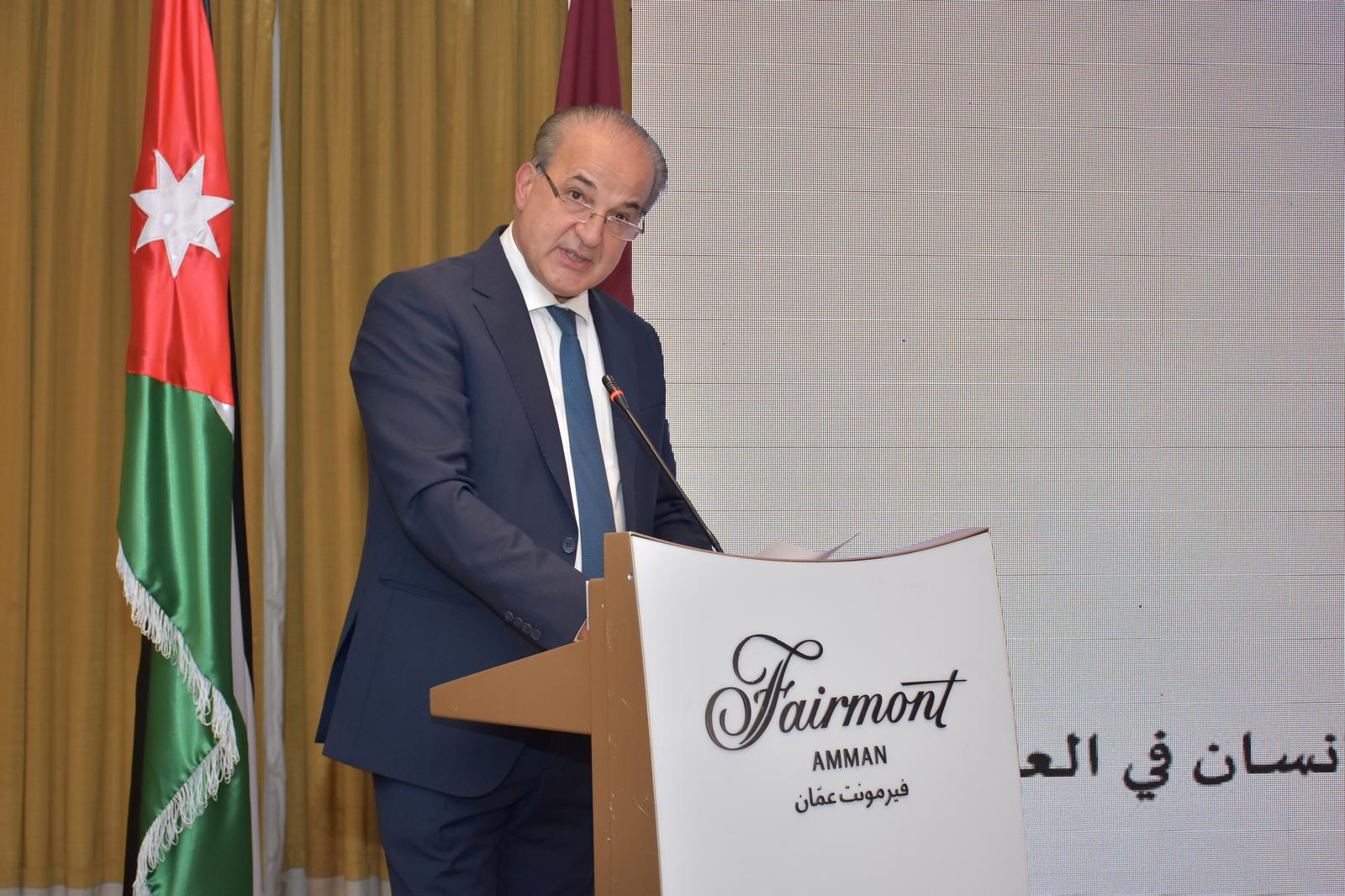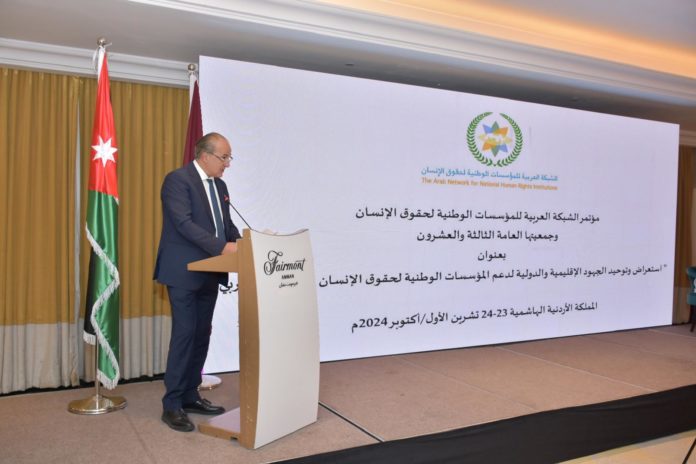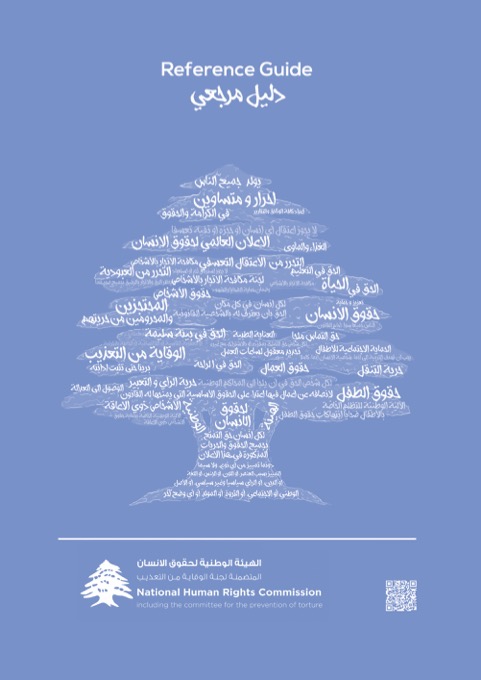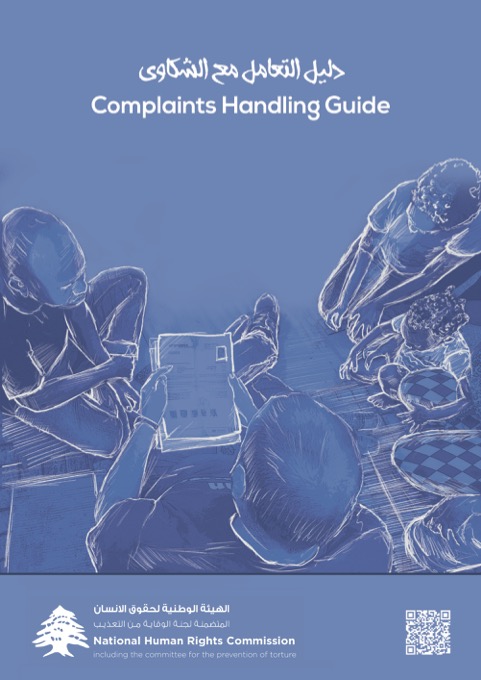هذه المقالة متاحة أيضًا بـ: العربية (Arabic)
Gerges: We call for the establishment of an independent, continuous international investigation committee to investigate all Israeli violations in Lebanon.
Al-Attiyah: Leaving war criminals unaccountable or unpunished is the greatest threat to international peace and security.
Nassour: We look forward to the General Assembly’s results, which will form the basis for our future joint efforts.
Dr. Fadi Gerges, Chair of the National Human Rights Commission in Lebanon, including the Committee for the Prevention of Torture, participated in the 23rd General Assembly of the Arab Network of National Human Rights Institutions, held in Jordan on October 23–24, 2024. The conference, titled “Reviewing and Unifying Regional and International Efforts to Support National Human Rights Institutions in the Arab World,” featured high-level participation from representatives of national human rights institutions in Arab countries and international organizations concerned with human rights. Notable attendees included Abdulmonem Saleh Shehadeh Al-Awdat, Jordan’s Minister of Political and Parliamentary Affairs; Mohammed Al-Nassour, Head of the Middle East and North Africa region at the Office of the United Nations High Commissioner for Human Rights (OHCHR); Mariam bint Abdullah Al-Attiyah, President of the Global Alliance of National Human Rights Institutions and Chair of the National Human Rights Committee in Qatar; and Sultan Al-Jamali, Secretary General of the Arab Network of National Human Rights Institutions. During the General Assembly, the presidency of the Arab Network was transferred from Egypt to Jordan, and Samar Al-Haj, Chair of the National Center for Human Rights in Jordan, represented it.
Gerges
In his address, Dr. Gerges stressed the importance of enhancing coordination between national human rights institutions at both regional and international levels. He highlighted the significant challenges facing human rights in Lebanon due to the complex political and security circumstances, particularly the ongoing Israeli aggression against Lebanon and Palestine. He emphasized the need for continuous technical and logistical support from the Arab Network to strengthen joint efforts in protecting human rights in the Arab region.
During the conference session, Dr. Gerges presented a paper titled “The National Human Rights Commission, including the Committee for the Prevention of Torture: Challenges and Proposals.” The paper outlined the internal and external challenges facing Lebanon’s National Human Rights Commission while assessing the impact of the Arab Network’s programs on enhancing the capacities of national institutions.
Dr. Gerges began by thanking the Arab Network for its ongoing support of Lebanon’s National Human Rights Commission, noting the critical role such institutions play in promoting and protecting human rights at the national level. He also discussed the increasing challenges in Lebanon, exacerbated by Israeli aggression on both Lebanon and Gaza, underscoring the necessity for cooperation among Arab national human rights institutions.

Regarding the impact of the Arab Network’s programs on national human rights institutions, Dr. Gerges praised the network’s role in building capacity, particularly in conducting human rights monitoring and visiting detention facilities. He also commended the logistical support for Lebanese participation in international and regional conferences, enhancing Lebanon’s global standing.
In this context, Dr.Gerges called for continued support from the Arab Network, urging the provision of a permanent headquarters for the Lebanese Commission and funding for necessary personnel salaries. He argued that this would allow members to perform their duties better and improve communication with national and international human rights bodies.
Dr. Gerges also called for enhanced financial and administrative stability for the Lebanese Commission, especially given the exceptional circumstances resulting from Israeli aggression. He outlined internal and external challenges, including a lack of human and financial resources and the Lebanese government’s delay in finalizing the Commission’s file with the Global Alliance of National Human Rights Institutions (GANHRI). External challenges include political violence, sectarian conflicts, and Lebanon’s worsening economic and social situation, all of which complicate human rights monitoring efforts.
Dr. Gerges emphasized the Commission’s pivotal role in documenting Israeli human rights violations in Lebanon and called for the Arab Network to strengthen its efforts to pressure the international community to take firm action against these violations. He also called for legal and technical support for the Lebanese Commission to help document Israeli violations and hold those responsible accountable.
The National Human Rights Commission in Lebanon views Israeli violations as one of the most significant challenges facing the international human rights system. Therefore, the Commission proposes several steps to overcome these challenges, including:
- Building the capacity of staff within the Lebanese Commission.
- Assisting the Commission in monitoring, documenting, and preparing reports during the conflict by recommending cooperating bodies and providing expert staff.
- Providing legal and technical support and conducting human rights diplomacy to stop the war on Lebanon and help hold Israeli leaders accountable for violations of international humanitarian law and human rights law.
The Commission also called on the Arab Network to support Lebanon’s proposal to convene an extraordinary session of the Human Rights Council to address the grave human rights situation in Lebanon. The Lebanese government was also urged to submit a declaration to the International Criminal Court (ICC) accepting its jurisdiction over crimes committed in Lebanon since October 7, 2023.
Amid the current deteriorating human rights situation in Lebanon, the Commission issued an urgent call for the UN Human Rights Council’s special procedures to send a delegation of Special Rapporteurs to investigate violations of human rights and humanitarian law caused by Israeli aggression.
Al-Attiyah
In her speech at the opening of the General Assembly of the Arab Network, Ms. Mariam bint Abdullah Al-Attiyah, Chair of the Global Alliance of National Human Rights Institutions and Chair of the National Human Rights Committee, stated: “The atrocities committed by Israeli aggression in Palestine and Lebanon place great responsibilities upon us, the foremost of which is continuing to support the principles of human rights, no matter how painful and overwhelming the issue of double standards in their application may seem.” She added that human rights are a global legacy that concerns and belongs to all of us, emphasizing that everyone must uphold human rights.
Al-Attiyah stressed the importance of continuing efforts to achieve justice and mobilizing resources to prosecute war criminals, ensuring they do not escape punishment. She affirmed that allowing violators to go unaccountable poses the greatest threat to international peace and security. She stated, “It is essential that we remain undeterred and steadfast in our determination, even when there seems to be a decline—or rather, a collapse—of humanitarian values and principles. We are certain that humanity will ultimately prevail.”
During her speech, Al-Attiyah explained that the Global Alliance of National Human Rights Institutions has worked to provide support to its members in conflict zones and areas experiencing war and strife. She added that the Global Alliance has taken clear stances in supporting institutions in Iraq, Palestine, Lebanon, Yemen, Libya, and Sudan and is always committed to finding resources to ensure the stability and continuity of these institutions’ activities with the highest degree of independence.
Nassour
In his speech at the opening of the General Assembly of the Arab Network, Mohammed Al-Nassour, Head of the Middle East and North Africa region at the Office of the United Nations High Commissioner for Human Rights (OHCHR), expressed the High Commissioner Volker Turk’s appreciation for the network’s efforts in promoting human rights in the Arab region and for providing a platform for the exchange of knowledge and expertise. Nassour emphasized the crucial role that national human rights institutions play in promoting and monitoring human rights at national and international levels. He praised the conference’s focus on supporting these institutions by the Paris Principles. He also highlighted the continuous support provided by OHCHR to Arab institutions through training programs and technical advice, strengthening their ability to influence public policies and adhere to international standards. Nassour pointed out national institutions’ challenges, including restrictive laws, political pressures, lack of resources, and security and technological challenges. He stressed the importance of this conference in reviewing and assessing partnerships to support these institutions in the future. In conclusion, Nassour congratulated the National Center for Human Rights in Jordan on assuming the presidency of the Arab Network and announced the organization of a regional discussion on human rights and digital technologies in December.
Al-Awdat
Abdulmonem Al-Awdat, Minister of Political and Parliamentary Affairs, emphasized that Jordan has taken a deep and active approach to human rights throughout its democratic journey, viewing it as a strategic choice and a developmental project led by King Abdullah II. He noted that the King outlined a roadmap for this issue in seven discussion papers, which covered all aspects of ensuring the right of Jordanians to participate in decision-making regarding their present and future through a political modernization process that will eventually lead to the formation of party-based governments. Al-Awdat added that Jordan’s journey in respecting human rights aligns with the principles of the Great Arab Revolt, led by Sharif Hussein and carried on by subsequent Hashemite kings, aiming for the freedom, independence, and legitimate rights of the Arab people to a dignified life and a promising future. He emphasized that international legitimacy and human rights organizations today face a real test of their values and effectiveness in influencing the course of events by putting an end to Israeli crimes in Gaza and Lebanon, which flagrantly violate all international laws, agreements, and treaties. He also pointed out Jordan’s efforts, under the leadership of King Abdullah, to send humanitarian aid to Gaza and rally Arab and international support to increase and sustain its delivery to victims of the aggression.
Khattab
In her address, Ambassador Moushira Khattab, President of the National Council for Human Rights in Egypt, handed over the presidency of the Arab Network to Samar Al-Haj Hassan, Chair of the Board of Trustees of the National Center for Human Rights in Jordan. Khattab affirmed that the Arab Network is working to expose the inhumane crimes of the Israeli occupation in Gaza and its attempts to displace its people, commending the efforts made in this regard amidst the most heinous crimes and blatant human rights violations and the glaring double standards in the face of deafening silence. She stressed that peace will not be achieved without the establishment of an independent Palestinian state and that the war on Gaza has exposed the international system’s failure to achieve justice and respect for human rights. Despite the gravity of the situation, Khattab pointed out that national institutions remain determined to uphold human rights, making them a lived reality for all individuals, without discrimination for any reason.
Al-Haj Hassan
Samar Al-Haj Hassan expressed her pride in Jordan hosting this critical conference, highlighting that Jordan has spared no effort in supporting the Palestinian people through all their crises over the decades, particularly in the recent war on Gaza and Lebanon. She noted that this support has come in humanitarian and medical aid, strenuous diplomatic efforts to stop the aggression, and popular demonstrations. Al-Haj Hassan emphasized that this conference, which brings together Arab human rights experts, is focused on justice amidst the silence surrounding crimes and on the dignity and humanity of every Arab who may face any violation. She also highlighted the role of the network in supporting national human rights institutions, especially in countries affected by conflicts and struggles.
Al-Jamali
Sultan Al-Jamali, Secretary General of the Arab Network, presented the network’s efforts in implementing its programs, noting that all operational plan objectives 2023 had been achieved. He highlighted updates designed to address the challenges that emerged from the brutal war on Gaza, the West Bank, and Lebanon by the Israeli occupation, which violated all international laws and norms.
Arab Network Conference
The two-day conference discussed the impact of the network’s programs, emerging challenges, visions, recommendations, and efforts to support national human rights institutions and proposals for their development. The conference also focused on supporting the efforts of the Independent Commission for Human Rights in Palestine to address Israeli war crimes and prevent impunity. It addressed the internal challenges facing national human rights institutions, such as staff attrition, the lack of expert personnel, and inadequate funding relative to the human rights mandates they are expected to promote and protect. Additionally, the conference examined the instability of institutional independence (legal, financial, operational, policy, membership, and independent thinking), which in some countries is subject to political shifts or emergencies during wars and conflicts.
External challenges facing these institutions were also discussed, including the difficulty of cooperating with government entities while fulfilling their mandates and interacting with civil society and the international human rights system. These challenges often stem from a lack of political will, insufficient resources, or serious cooperation and a spirit of competition rather than collaboration.
The Arab Network chose to focus on the extraordinary challenges facing national human rights institutions in conflict and war zones, particularly in occupied Palestine, where ongoing Israeli aggression continues to result in numerous violations of international humanitarian law. The conference also highlighted recent developments in Lebanon following the violent war waged by the Israeli occupation, the challenges faced by Lebanon’s National Human Rights Commission in this regard, and the support necessary to enable it to carry out its tasks. Discussions also addressed the impact of the conflict in Sudan, including serious violations affecting the work of the Sudanese National Human Rights Commission and the effects of instability in Libya on the role and capabilities of Libya’s National Committee for Public Freedoms and Human Rights. The conference explored how to mobilize resources and support for these institutions with the participation of relevant stakeholders, partners, experts, and consultants.
The Arab Network’s discussions sought to review collaboration with partners and stakeholders, evaluate best practices, and identify weaknesses to be addressed through steady steps and with the participation and support of all national, regional, and international partners and stakeholders. This includes contractual and non-contractual mechanisms and all UN teams, offices, programs, and commissions. Arab national human rights institutions are awaiting encouragement and cooperation from stakeholders nationally and internationally, affirming the unity and universality of the human rights movement and the principle of leaving no one behind.


